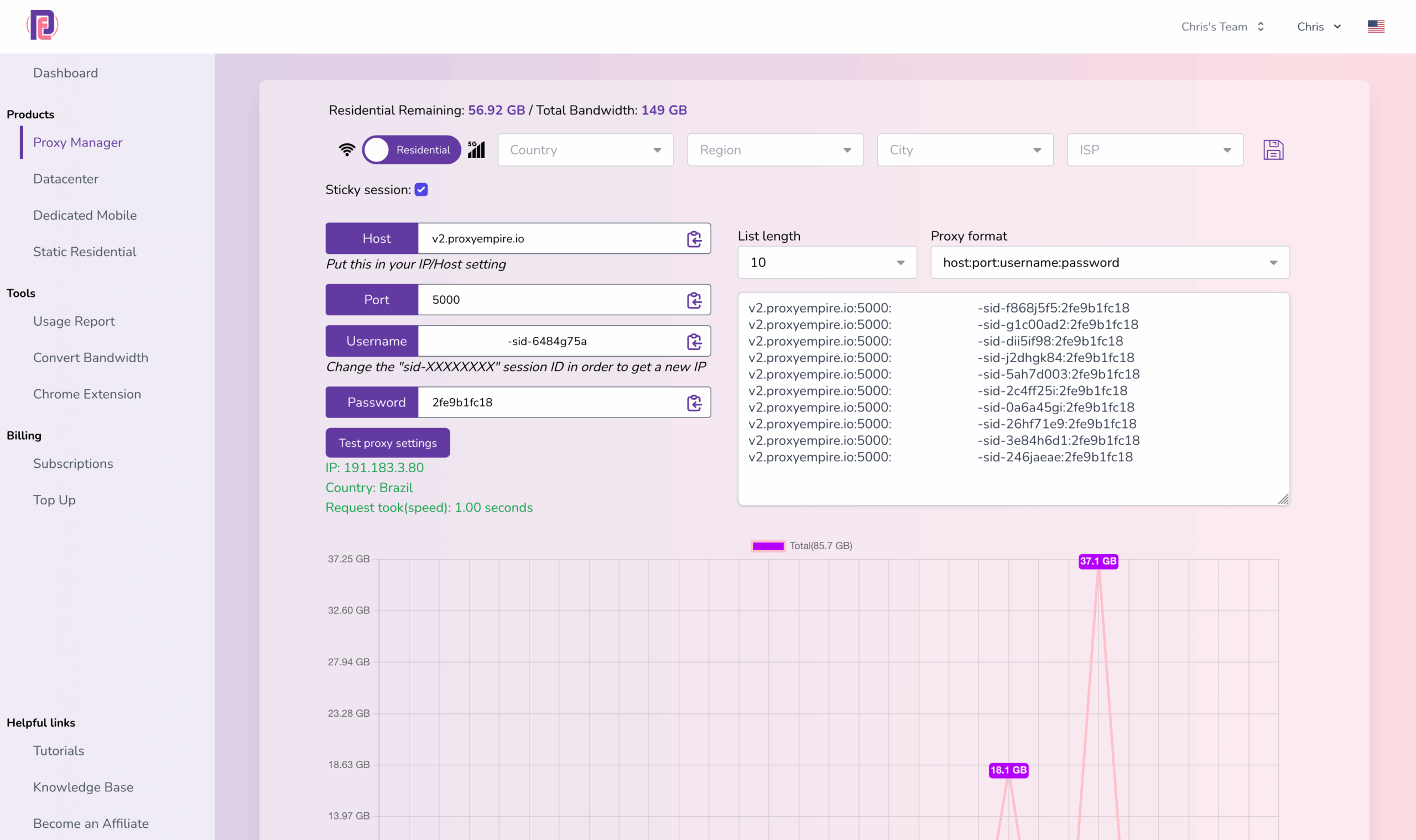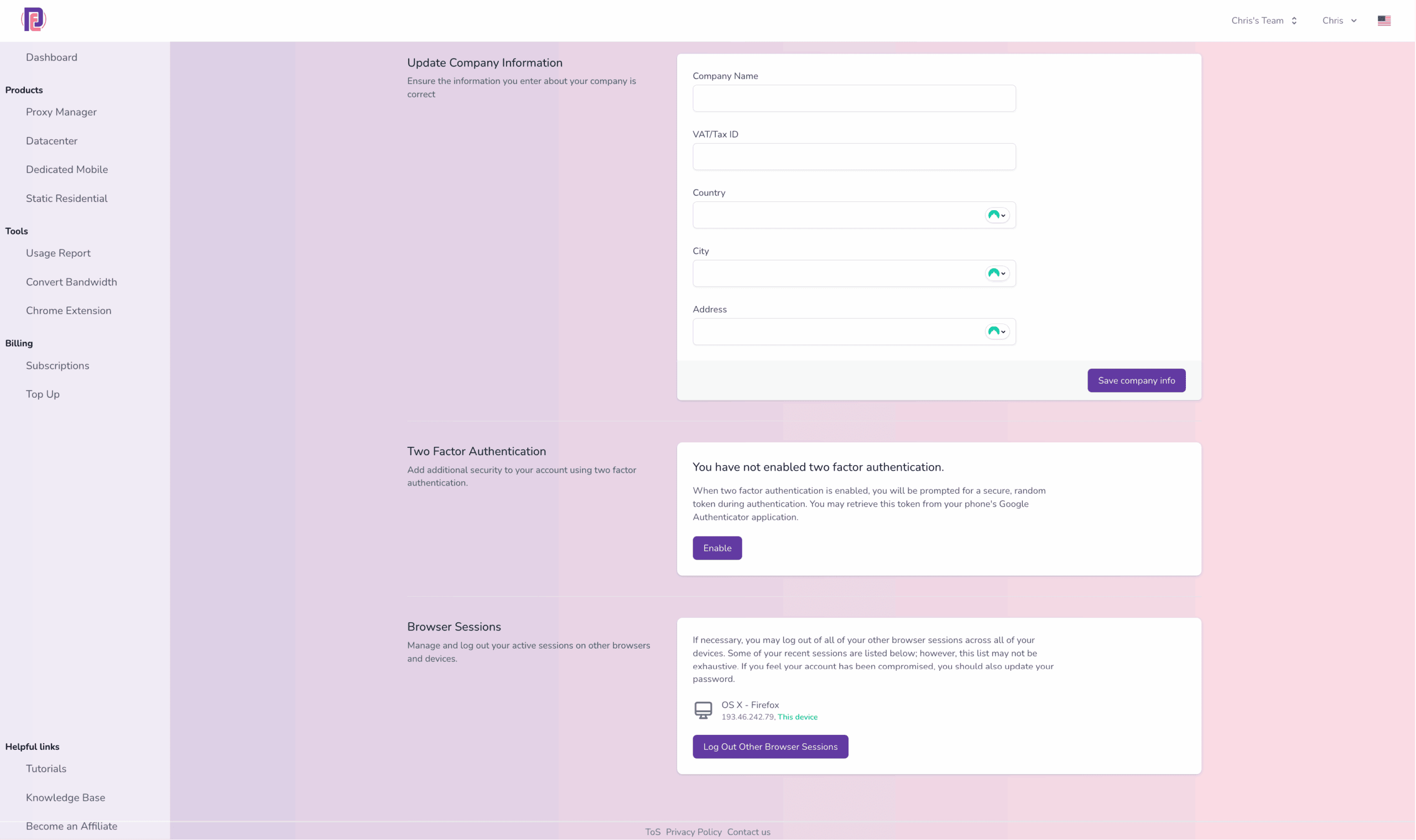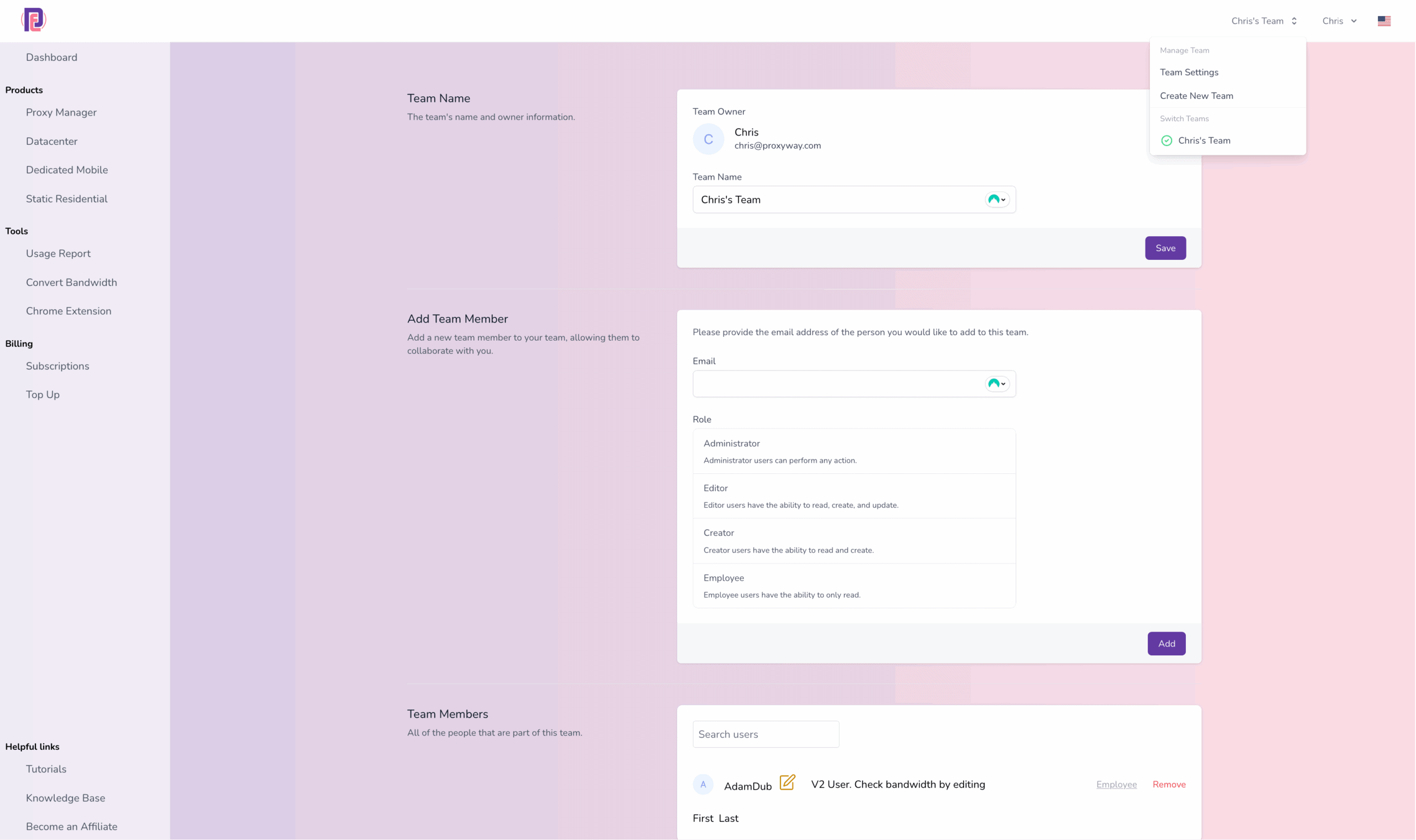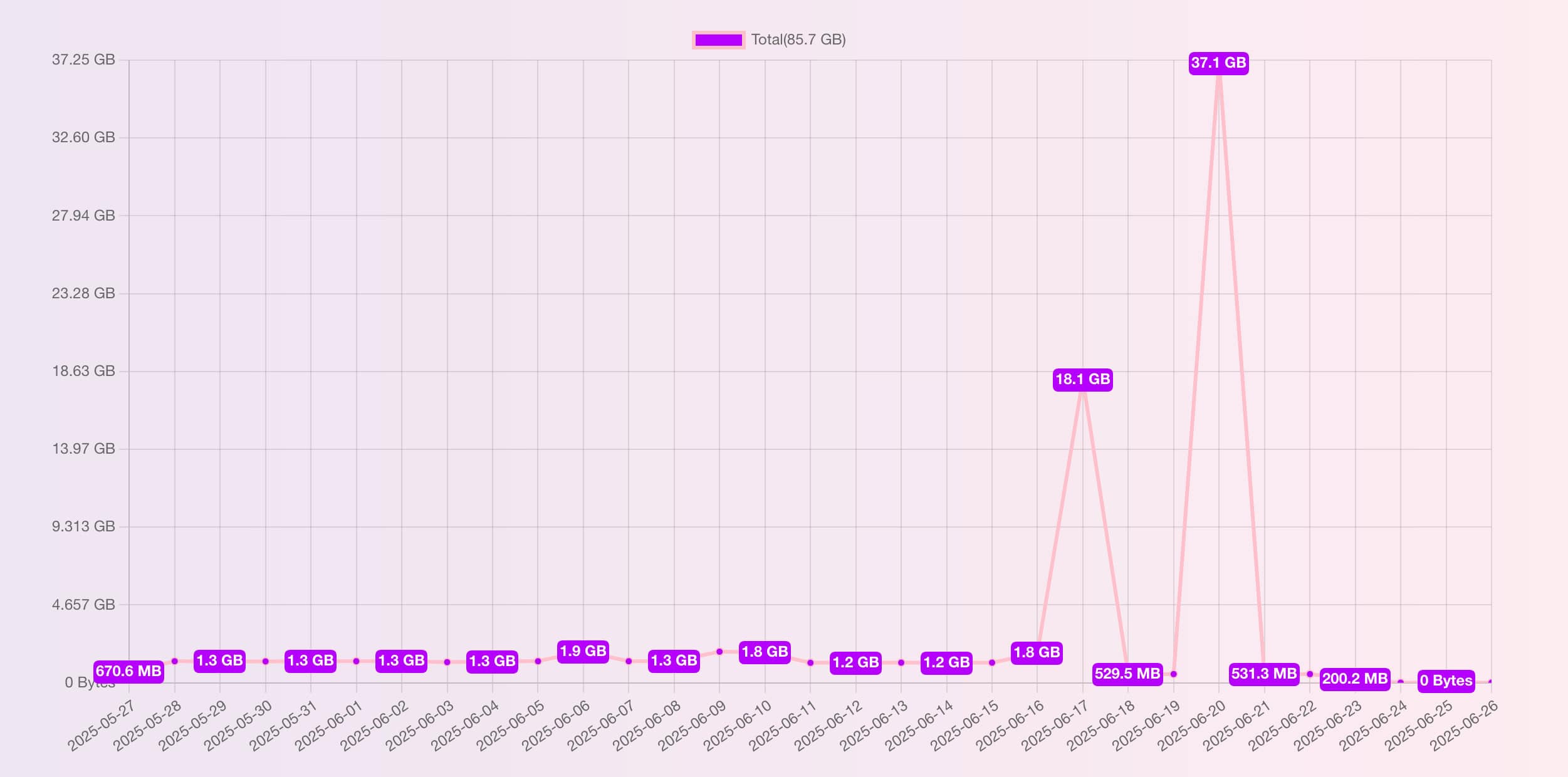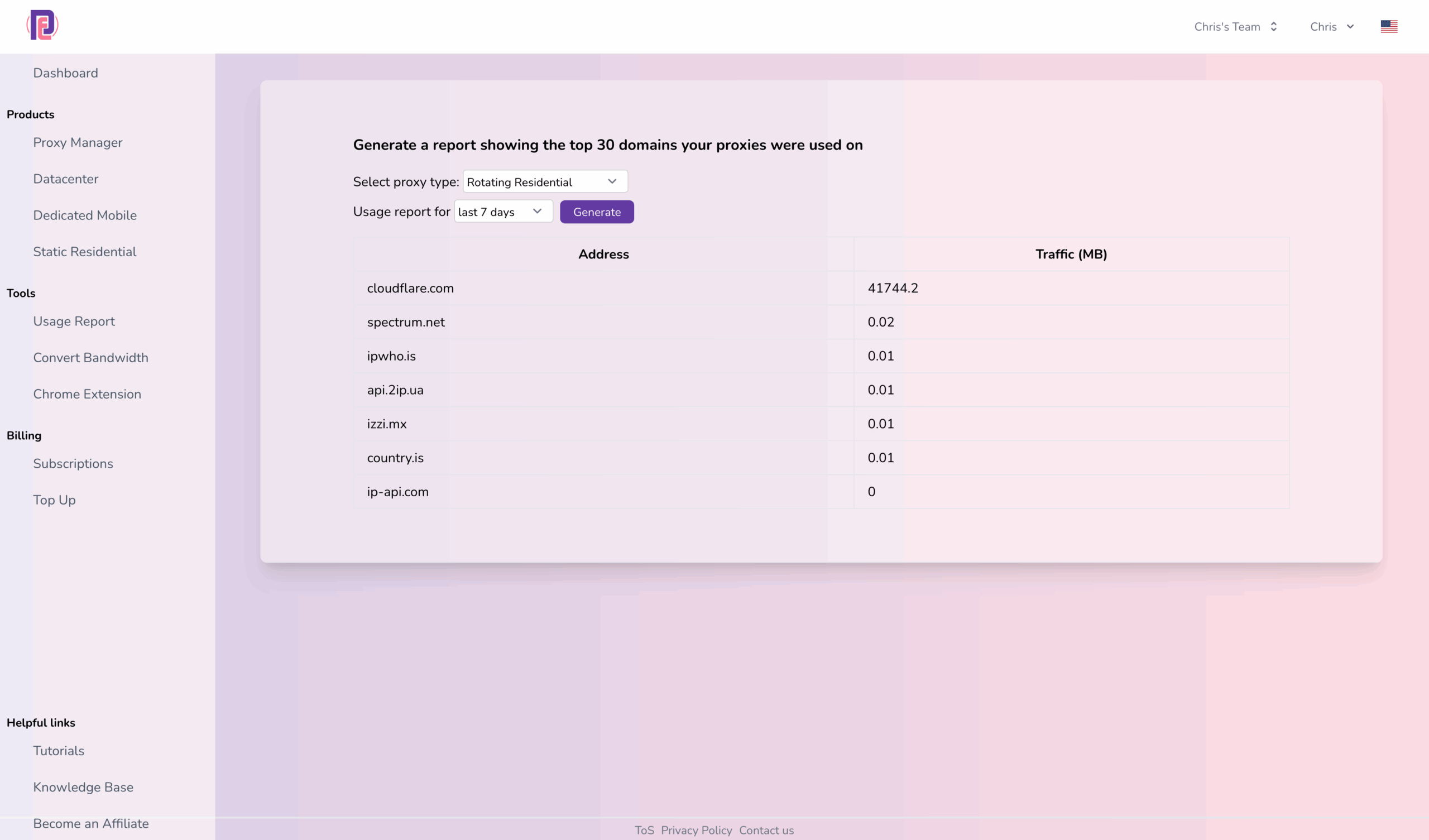
ProxyEmpire Review
All major proxy types, rollover traffic, and features like ISP targeting are some of ProxyEmpire’s highlights.
ProxyEmpire is one of those middle-of-the-pack options: not exactly cheap but also not quite premium. Aside from one feature, which is non-expiring traffic, it’s hard to distinguish something unique about it. But that’s not necessarily bad; with a varied and balanced line-up, ProxyEmpire can be a strong pick for many use cases.
Is it, though? Let’s find out!
News about ProxyEmpire
-
By Adam Dubois
- Provider News
General Information
- Country: Bulgaria
- Founded: 2020
- Employees (LinkedIn): 5-10
- Proxy networks: Residential, mobile, datacenter, ISP
- Supporting tools: Chrome extension
- Price segment: Mid-market
- Starting price: $3.50
- Payment methods: Credit card, PayPal, wire transfer
- Trial: Paid ($1.97)
ProxyEmpire is a Bulgarian-registered company in business since 2020. It sells access to proxy servers, also teasing several web scraping APIs on the website.
The provider’s LinkedIn page suggests that it’s not a big company – but also not a one-man home operation. The fact that we can actually see real people behind it is reassuring when every second proxy vendor still operates incognito.
ProxyEmpire’s main customer seems to be solopreneurs and small to medium businesses. The provider frequents affiliate-oriented conferences, but it otherwise supports a wide range of use cases. Price wise, we’d consider ProxyEmpire a mid-market provider like Decodo or IPRoyal, though at the time writing it leaned toward more premium alternatives.
ProxyEmpire mentions ethical proxy sourcing throughout the website. We could find no concrete information about how the provider acquires IPs, suggesting that at least some of them may be resold. So while we have no way to verify these claims, they’re at least supported by ProxyEmpire’s participation in the Ethical Web Data Collection Initiative.
All in all, ProxyEmpire is a stable generalist proxy server provider built around self-service and ease of access.
ProxyEmpire Proxy Networks
ProxyEmpire offers all major proxy types: datacenter, static residential (ISP), residential, and two varieties of mobile proxy servers.
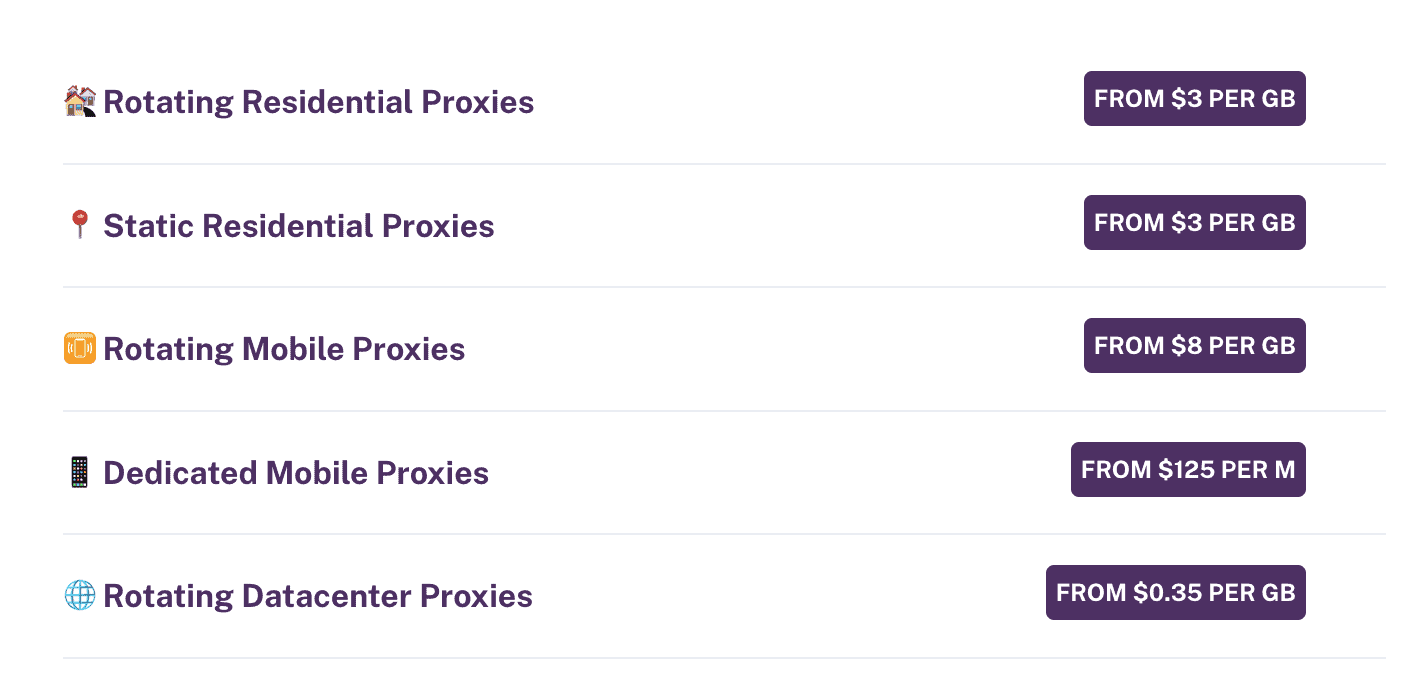
In this review, we tested the following products. Click on the titles to read the full breakdown:
Residential
Residential proxies are ProxyEmpire’s main product. They’re acquired from real devices around the world, though we don’t know the precise sourcing methods.
Pool Size & Coverage
- Advertised pool size: 9.3 million
- Countries: 170+
- Filtering: Country, region, state, city, ISP
ProxyEmpire’s advertised proxy pool is small – some providers claim to control dozens of times more IPs. However, it supports flexible location filters, including city and ISP. You can combine all of them together.
ProxyEmpire’s dashboard shows how many proxies were online in the last 24 hours. So we know that, for example, there were nearly 380k IP in the US and over 500k Brazilian IPs available.
Our benchmark (June 2025)
| Gateway | Requests | Unique IPs | Residential %* |
| Global | 1.2M over 21 days | 843,738 | 97.49% |
| US | 560k over 14 days | 360,384 | 99.05% |
| UK | 560k over 14 days | 93,258 | 98.03% |
| EU** | 1.2M over 14 days | 400,870 | 99.27% |
| Brazil | 560k over 14 days | 188,013 | 98.00% |
| India | 560k over 14 days | 302,083 | 95.15% |
| Australia | 140k over 7 days | 29,789 | 98.82% |
* IP2Location database, Usage type data point (ISP, ISP/MOB, MOB IPs)
** Combines Germany, France, Spain, Italy, the Netherlands.
Comparison with other providers
Don’t be fooled by the advertised numbers: in our benchmarks, ProxyEmpire had an impressive proxy pool which rivaled much larger competitors on paper. We found over 350,000 unique IPs in the US and over 400k in Europe. According to our database, the vast majority were indeed on residential connections.
Features
- Connection method: Gateway address
- Rotation: Every request, as long as available, custom sessions
- Protocols: HTTP, HTTPS, SOCKS5 (with UDP)
- Concurrency: Unlimited
- Traffic: Plan based
- Authentication: Credentials
- Sub-users: ✅
Like most residential proxy networks, ProxyEmpire uses a gateway address to send your requests to the proxy server. The service offers good protocol support, including UDP, as well as several rotation options. It’s also pretty much unlimited as long as you have traffic allowance.
The main omission is no IP whitelisting for authentication. And while you can create sub-users, the only way to manage them is through ProxyEmpire’s API.
Integration Examples
- Basic request: USERNAME:[email protected]:5000
- Using location filters: USERNAME-country-us-region-california-city-san+francisco-isp-at&t+internet:[email protected]:5000
- Establishing sticky sessions: USERNAME-sid-ID:[email protected]:5000
ProxyEmpire gives you one gateway address and port; you can customize access by adding parameters to the username. A session is represented by an ID, which you can freely assign or let ProxyEmpire generate one for you. A different ID equals a new session.
Pricing Plans
- Model: PAYG, subscription (with traffic rollover)
- Format: Traffic
- Upsells: ❌
- Starting price: $3.5 for 1 GB
- Trial: $1.97 for 100 MB
ProxyEmpire offers a subscription-based pricing model in theory. In practice, it’s actually much better: the traffic you buy never expires, even if you quit and resubscribe later. Otherwise, it adds up to your unused traffic allowance (if any) with every passing month.
Another welcome bonus is that you get all features for the base price, and there’s no need to unlock extra functionality. The public plans top out at 1 TB of data at $1,500.
Compared to mid-market alternatives like Decodo or IPRoyal, ProxyEmpire’s rates are very similar throughout the pricing range.
Standardized pricing comparison
Performance Benchmarks
We last tested ProxyEmpire’s residential proxies in June 2025.
Infrastructure performance
Requests: Same as the pool test (140k to 1.2M per gateway)
Target: Nearest server of a global CDN (~6 KB response size)
| Gateway | Our server location | Avg. success rate | Avg. response time |
| Global | DE | 98.88% | 1.34 s |
| US | US | 99.35% | 1.48 s |
| UK | DE | 98.26% | 1.78 s |
| EU | DE | 99.74% | 0.91 s |
| Brazil | US | 99.32% | 2.06 s |
| India | SG | 99.65% | 2.50 s |
| Australia | SG | 99.75% | 2.48 s |
Comparison with other providers
Though ProxyEmpire couldn’t reach the best competitors, its proxies reliably established connections during the testing period. At their best, requests succeeded 99.75% of the time.
However, the infrastructure wasn’t fast: top providers in the US returned responses two to three times quicker. In the UK, the difference reached up to five times.
Response time with a 2 MB page
Requests: 15,000 with the Global gateway, 5,000 with the US gateway
Target: Nearest server of a global CDN
| Gateway | Our server location | Avg. response time |
| Global | DE | 6.50 s |
| US | US | 4.27 s |
ProxyEmpire did okay with large page sizes. These results place it around the middle of the dozen providers we’ve tested. However, we also experienced more timeouts, bringing the success rate to still respectable 97-98%.
Performance with popular targets
Requests: ~2,600 per target
Location: US (both the gateway and our server)
| Avg. success rate | Avg. response time | |
| Amazon | 98.18% | 4.71 s |
| 92.05% | 6.83 s | |
| Total | 95.12% | 5.77 s |
The residential proxies did well with two out of our three targets, struggling only with Google. However, we’re not sure whether it was the proxies our or scraper at fault, so we omitted this target for now.
In any case, they performed relatively slowly, reinforcing the results of our synthetic benchmarks.
Mobile (rotating)
Mobile proxies are ProxyEmpire’s option for mobile-first or hardest to access websites. They share most of the same features with the residential proxy network.
Note that these are real-user devices and not mobile dongle farms – they’re more diverse but also less stable.
Pool Size & Coverage
- Advertised pool size: 4 million
- Countries: 170+
- Filtering: Country, state, city, ISP
ProxyEmpire’s advertised pool size is modest compared to alternatives. However, the provider offers a broad selection of countries and many ways to filter them. All the filters can be combined together, which is another bonus.
Helpfully for us, ProxyEmpire discloses the number of unique IPs each country had in the last 24 hours. When we checked, we saw 100k IPs in India and 37k in the US. The top locales were mostly tier 2 & 3 countries like Nigeria or Malaysia.
Our benchmark (June 2025)
| Gateway | Requests | Unique IPs | Mobile %* |
| Global | 280k over 14 days | 151,261 | 92.77% |
| US | 280k over 14 days | 76,317 | 65.15% |
| UK | 280k over 14 days | 20,546 | 98.84% |
| EU** | 280k over 14 days | 61,744 | 93.07% |
| Brazil | 280k over 14 days | 41,275 | 99.05% |
| India | 280k over 14 days | 206,326 | 99.89% |
| Australia | 140k over 7 days | 6,952 | 99.51% |
* IP2Location database, Usage type data point ( ISP/MOB, MOB IPs)
** Combines Germany, France, Spain, Italy, the Netherlands.
Our tests found ProxyEmpire’s mobile pool to be decently large. Over 76k unique IPs in the US are nothing to scoff at, though India took the spotlight. These IPs were predominantly on mobile networks; the only questionable location was the US, where a database identified Comcast IPs as not mobile.
Features
- Connection method: Gateway address
- Rotation: Every request, as long as available, custom sessions
- Protocols: HTTP, HTTPS, SOCKS5 (with UDP)
- Concurrency: Unlimited
- Traffic: Plan based
- Authentication: Credentials
- Sub-users: ✅
The mobile proxy network supports a solid variety of features and imposes few limits outside of traffic. All connection protocols are available, though the number of open ports will be restricted by default.
The biggest missing feature is IP whitelisting. This rules out software where credentials can’t be used – or at least significantly complicates the setup.
Integration Examples
- Basic request: USERNAME:[email protected]:5000
- Using location filters: USERNAME-country-us-region-california-city-san+francisco-isp-at&t+internet:[email protected]:5000
- Establishing sticky sessions: USERNAME-sid-ID:[email protected]:5000
ProxyEmpire’s mobile proxies use one gateway address and port. You can filter locations or establish sessions by modifying the username.
Pricing Plans
- Model: PAYG, subscription (with traffic rollover)
- Format: Traffic
- Upsells: ❌
- Starting price: $4.50 for 1 GB
- Trial: $1.97 for 50 MB
You can pay for the product as you go or receive better rates with a subscription. Traffic here doesn’t expire even when a subscription ends, so it always makes sense to buy more at once.
The plans start at $4.50 and reach $2,000 at $2/GB. ProxyEmpire’s rates are competitive with most mid-market and premium providers, though alternatives like DataImpulse or Decodo charge a little less.
Performance Benchmarks
We last tested ProxyEmpire’s mobile proxies in June 2025.
Infrastructure performance
Requests: Same as the pool test (140k to 280k)
Target: Nearest server of a global CDN (~6 KB page size)
| Gateway | Our server location | Avg. success rate | Avg. response time |
| Global | DE | 98.24% | 1.88 s |
| US | US | 99.22% | 1.82 s |
| UK | DE | 99.17% | 1.25 s |
| EU | DE | 99.27% | 1.26 s |
| Brazil | US | 98.70% | 2.06 s |
| India | SG | 98.90% | 3.21 s |
| Australia | SG | 99.55% | 2.65 s |
The proxies had a very decent success rate, which shows that the infrastructure works well. But just like the residential proxy network, they were slow – especially outside of Europe. We’d expect the response time to be at least twice faster.
How to Use ProxyEmpire
Registration
To register with ProxyEmpire, you’ll have to enter your name, email, and one of the following contacts: LinkedIn, Telegram, or Skype. The latter don’t seem to check for validity, so you can enter anything you want.
After confirming the registration via email, the dashboard will greet you with a second form. It asks to describe your use case, the products you’ll need, and your top three targets.
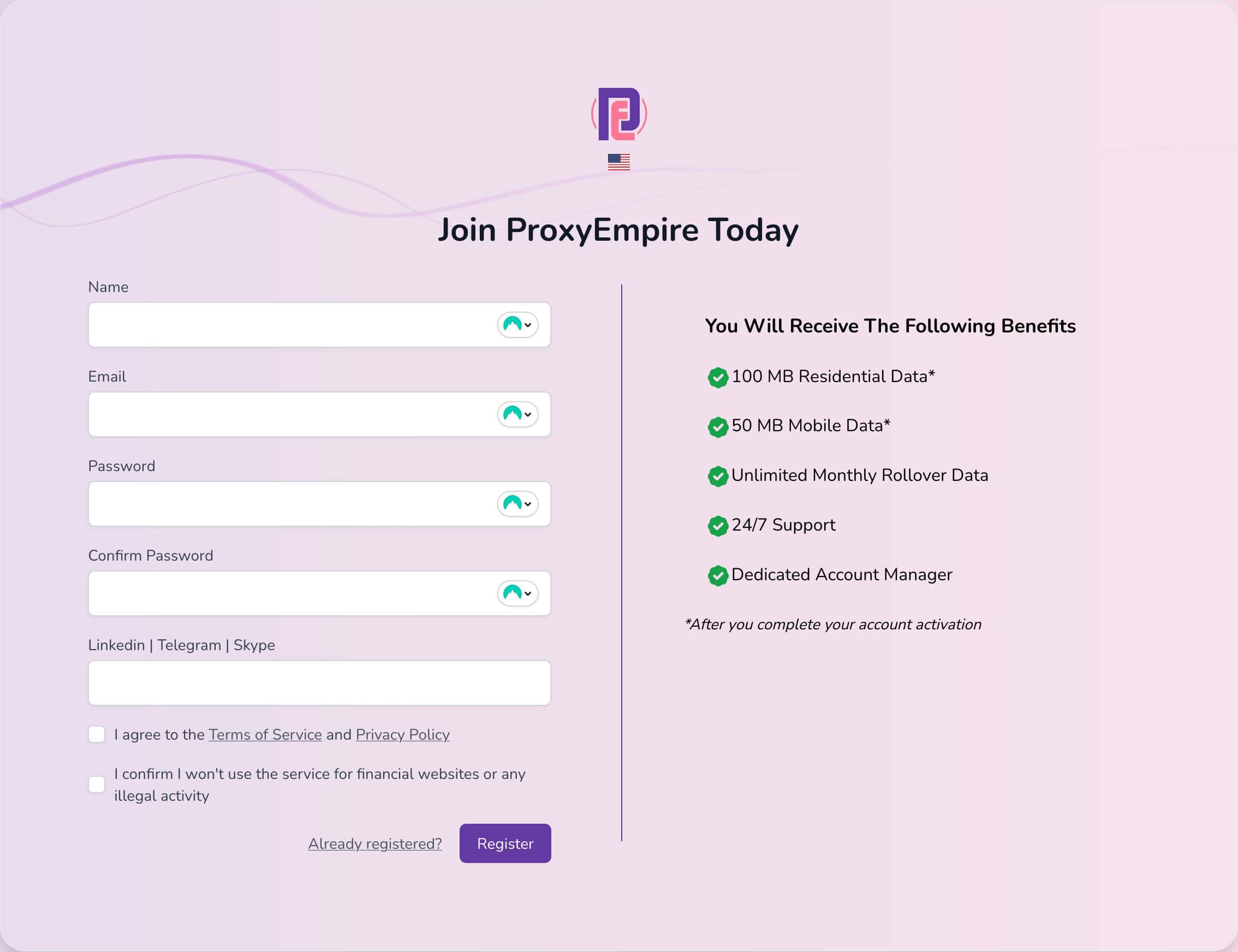
KYC and Usage Policies
There doesn’t seem to be a proactive KYC procedure. ProxyEmpire requires to activate the account with a paid trial, but you may just as well buy a plan.
We were told that customers encounter KYC when they want to access blocked domains or ports. The provider uses SumSub for verification, and it also requires explaining the need for forbidden resources.
The list of blocked websites includes financial, governmental, and other high-risk domains, such as PayPal, Stripe, banks, EA, and crypto. ProxyEmpire gives some examples but doesn’t provide the full list. In total, it includes around 8,000 domains with wildcards.
Dashboard
ProxyEmpire has a dashboard for working with its products. The dashboard is available in English, Russian, and Bulgarian.
The dashboard includes all the necessary functionality. You’ll be able to buy a plan, set up proxy servers, view usage statistics, and access help docs.
The dashboard’s main page displays usage graphs for all proxy types, as well as statistics with online IPs in the last 24 hours. Otherwise, individual products are contained to their own tabs.
All subscriptions are located in ProxyEmpire’s billing management portal. It allows buying a plan, setting up a payment method, and downloading invoices. We had a custom PAYG setup, so the portal missed the latter two features. ProxyEmpire uses Paddle, so invoices should arrive by email in any case.
There’s no wallet functionality; but because traffic never expires, there isn’t much of a need for that. You can track the remaining traffic allowance under each product, with no centralized place for those with multiple subscriptions. It’s possible to top up at any time by getting a package of your choosing.
One more interesting feature is the ability to transfer traffic between products. It worked with ProxyEmpire’s residential and static residential proxies when we last checked.
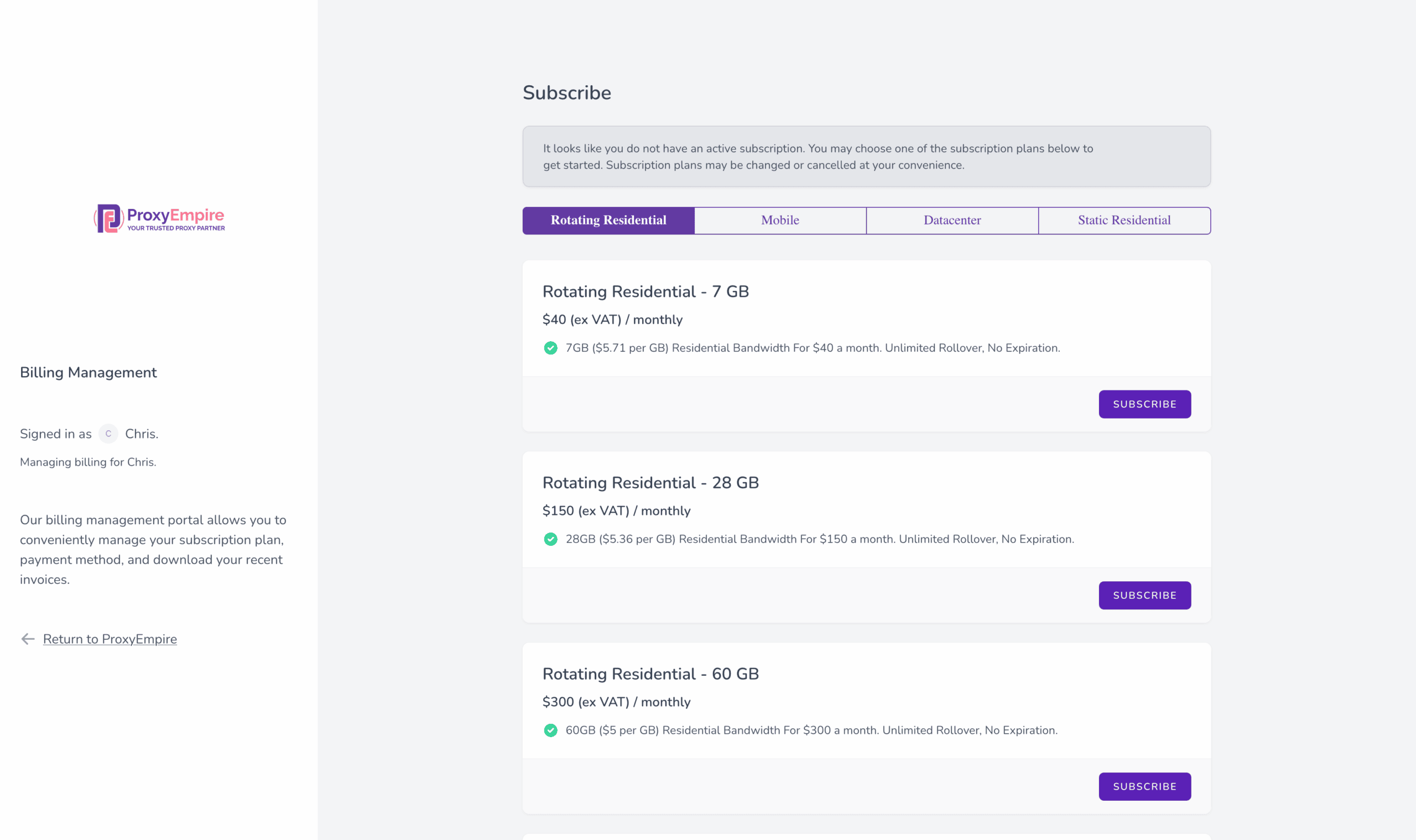
ProxyEmpire has built some elaborate access tools for its dashboard. For one, there’s 2FA to protect the account. Then, you can see all active logged in sessions. And finally, teams can collaborate by creating permissioned dashboard roles.
That said, the access to proxies themselves is much more limited. The dashboard gives no way to change the assigned credentials or create sub-users. Considering that you can have only one plan active per product, this makes managing larger projects complicated.
Proxy setup is done with provided widgets. They let you set up filters and sessions and then generate lists in several formats. The widget includes a proxy checker which is handy but checks only one IP at a time. It’d also be nice to have code samples for at least cURL.
ProxyEmpire’s usage tracking functionality is rudimentary. There’s one graph that shows your daily traffic expenditure for the past month. It’s updated once per day.
Another report generates top 30 domains by traffic for today, last three, seven, or 14 days. That’s about it.
Public API
ProxyEmpire has an API for managing access to its products programmatically. It’s barely documented, so you wouldn’t know about it unless you asked.
The API comes available for all customers. Its functionality includes managing sub-users, getting basic information about their traffic expenditure, and fetching available proxy filters.
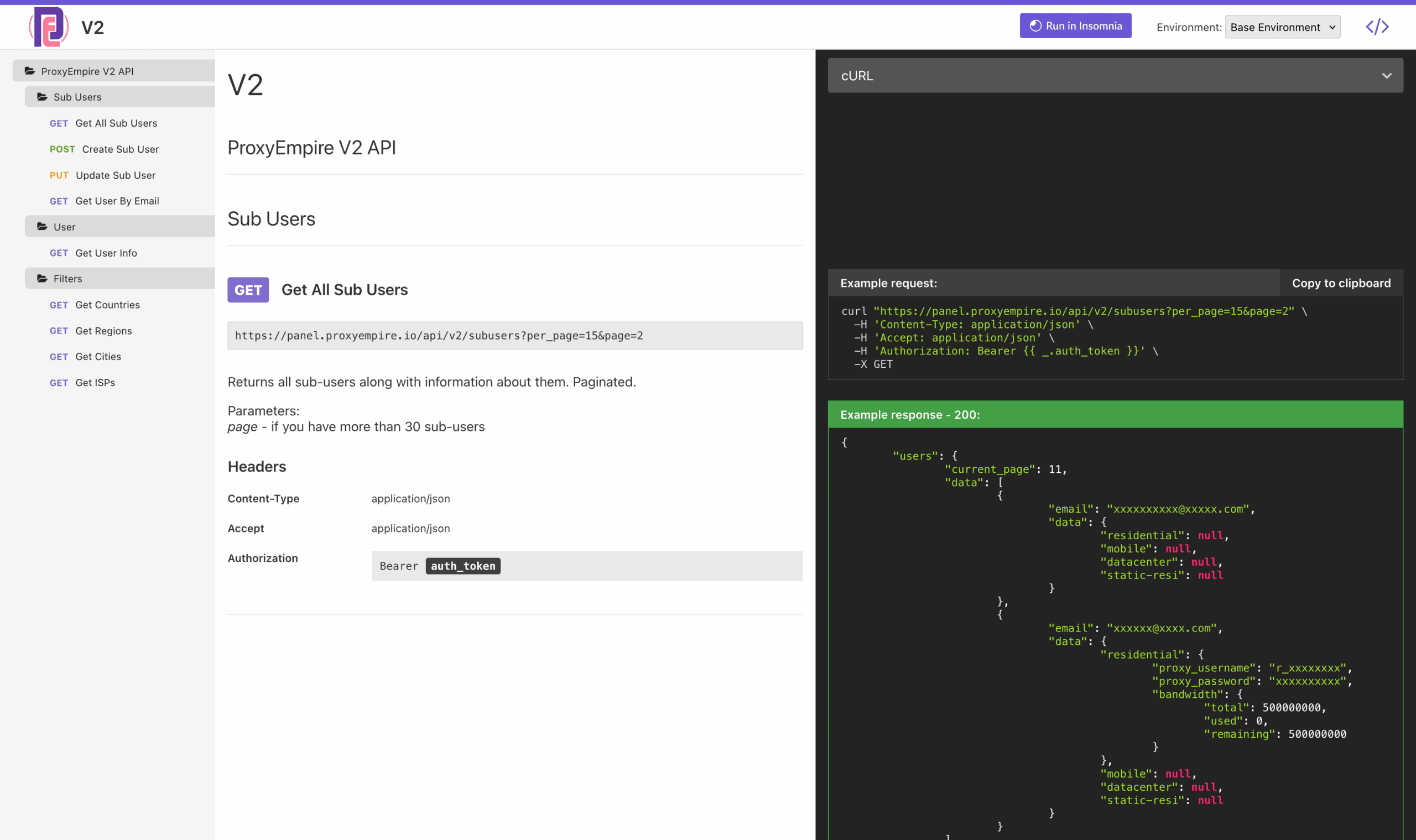
Documentation
ProxyEmpire’s documentation comes in the form of a knowledge base. When we wrote this section, the two categories included 22 articles for all of the provider’s products.
The knowledge base was enough to answer basic queries, but it was by no means comprehensive or complete. We missed integration examples and technical details, such as how to use the SOCKS5 protocol.
In addition, ProxyEmpire runs a YouTube channel with around a dozen tutorials for popular software, mostly web browsers.
All in all, compared to competitors like IPRoyal or Decodo, there’s much room for improvement.
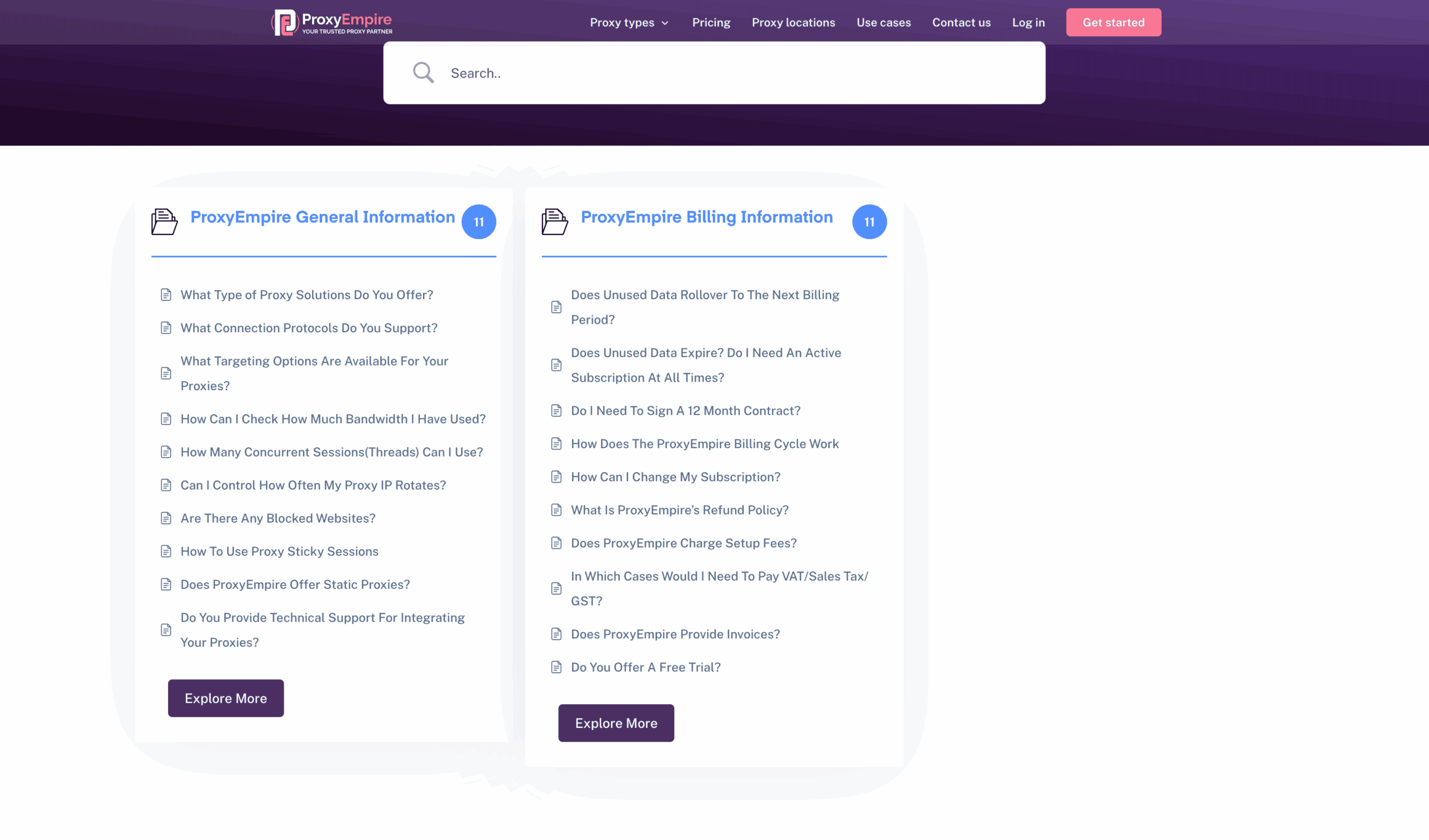
Hands-On Support
ProxyEmpire offers 24/7 support via live chat or email. Corporate and enterprise clients (so, those who buy 500 GB and more?) get a dedicated account manager.
We tried using the live chat during the morning in Europe. A reply came within a minute. The agent got confused by our question about open ports, mentioning proxy port numbers instead – one of them undocumented. They then double checked with a colleague and were able to provide a correct answer.
It wasn’t the best first impression, but we appreciate receiving live help so fast.
Conclusion
We’d like to reiterate the introduction: ProxyEmpire is a solid generalist provider.
It’s not cheap, nor the fastest, and the platform can be too limited for advanced use. On the other hand, you get many stable IPs, advanced targeting filters that can be combined together, and a good user experience.
If you think this trade-off is fair, go for it – you shouldn’t be disappointed.
ProxyEmpire Alternatives

Decodo will give you most of the same products, more advanced management tools, and top-in-class proxies.

IPRoyal is similar in many ways. The provider has fewer IPs, but they’re sourced in-house, faster, and offer the same non-expiring traffic.
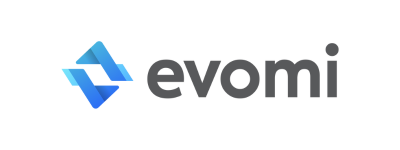
If you want something cheaper, Evomi’s residential proxy rates start from just $0.49. You can unlock advanced features by paying extra.

